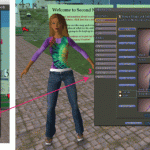#scio10
Back in January, at ScienceOnline2010, Sheril Kirshenbaum, Dr. Isis, and I led a session called "Online Civility and Its (Muppethugging) Discontents". Shortly after the session, I posted my first thoughts on how it went and on the lessons I was trying to take away from it.
Almost two months later, I'm ready to say some more about the session and the issues I think it raised.
My space, your space, our space.
To my mind, civil engagement is only an issue if you are engaging with other people. If you are conducting a soliloquy, rather than a colloquy, it's hard to imagine where you'd run into…
Here are some of the thoughts and questions that stayed with me from this session. (Here are my tweets from the session and the session's wiki page.)
The session was led by John McKay and Eric Michael Johnson. John posted the text of his presentation and Eric posted his presentation a la YouTube. I'm going to take this as permission to skip doing a proper recap here. Instead, I'm going to write about the big ideas this session raised for me.
First, I'm struck by how easy it is for those of us who were trained to do science to know very little about where scientific practices come from --…
Here are some of the thoughts and questions that stayed with me from this session. (Here are my tweets from the session and the session's wiki page.)
One of the things I found interesting about this session was that the session leaders' approach to the broad issue of promoting gender and ethnic diversity in science, engineering, technology, and M [mathematics here? I get the impression that sometimes the M in STEM is math and sometimes it's medicine, but I'm happy to set this taxonomic issue aside] was to look at particular initiatives, activities, or responses from smaller communities…
In a comment on a post at Henry Gee's blog (I'd link the comment itself, but for the life of me I cannot figure out where the permalink is), Ed Yong offers his view on the relation between politeness and civility. Quoth Ed:
My objection comes when people mistake politeness for virtue rather than what it actually is - artifice masquerading as virtue. Politeness is what you teach children to tell them when and how to speak and behave before they are fully rational and capable of thinking through the moral consequences of their words and actions.
Adults, being (technically) able to do this…
There was one session at ScienceOnline2010 which I did not Tweet as it was going on -- the session I led with Sheril Kirshenbaum and Dr. Isis. Here's how that session was described in the conference program:
Online Civility and Its (Muppethugging) Discontents - Janet Stemwedel, Sheril Kirshenbaum and Dr.Isis
Description: Janet, Sheril, and Isis regularly write about the role of civility in dialog with the public and other scientists. In this session, we will discuss the definition of civility, its importance in the communication of science, and how the call to civility can be used to derail…
Okay, I'll grant that visiting Second Life can seem a bit uncomfortable, especially at first, but it does open some new doors and present an alternative to travel.
In flu season, virtual visits could be the next best thing to being there. (Yikes, that sounds like an ad. No more yahoo news for me!)
Here's where you can attend ScienceOnline 2010 in Second Life (http://slurl.com/secondlife/Research%20Triangle%20Park/128/129/25).
The next excuse might be that you don't know how to use Second Life or what to do. Never fear. That's a solvable problem.
I have a primer on attending a…
A common theme I hear in talks on personalized medicine, is that increased access to genomic data and medical literature are changing the relationship between doctors and patients. Patients are through being passive recipients of paternalistic health care. They are demanding to participate and be treated as partners with health care providers.
Citizen science can serve a similar role.
Just as personalized medicine is starting to make it possible for individuals to monitor and participate in their own personal health, citizen science is making it possible for people to participate and…
Tomorrow I fly to North Carolina for the ScienceOnline 2010 conference, or unconference, where on Saturday I will sit down with Ed Yong, Carl Zimmer, John Timmer, and anyone else who squeezes into the room, to talk about rebooting science journalism. The obvious assumption behind the topic (if I can return to the titular metaphor) is that science journalism is such a mess that it needs not just cleaning up, but a wholesale restart. But "rebooting" is probably too mild a term for what most people think is needed; if we're to stick with digital metaphors, I'd to say the assumption is more that…
